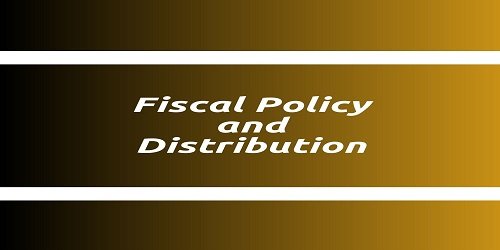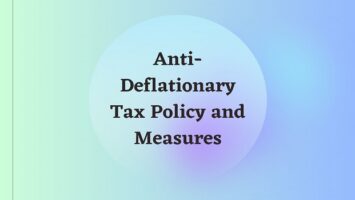Fiscal Policy and Distribution:
It is needless to emphasize the importance of the distributional effects of the rising national product. A mere increase in per capita income does not necessarily lead to an increase in the welfare of all sections of the people unless an equitable distribution of the rising national product is assured. An equitable distribution is usually taken to mean a reduction in the existing inequalities of income and wealth. The existence of extreme inequalities in income and wealth distribution may have adverse effects on the economic development of underdeveloped countries. It has rightly been pointed out by some economists that extreme inequalities in the distribution of income and wealth are detrimental to economic development in so far as they reduce the nutritional, health, and living standards of the people, create excessive demand for imported luxury consumption goods, further an excessive transfer of funds to abroad, may prevent the growth of internal markets, where such conditions exist, fiscal methods are appropriate to bring about more equitable distribution of incomes and channel additional resources into economic development.
Besides, extreme inequalities create political and social discontent and generate economic instability. Hence, the removal of inequalities of income and wealth is of great importance for economic development.
The problem of reducing inequalities of income and wealth may be solved through redistributive public expenditure and redistributive tax policy. The government to reduce inequalities should direct its expenditure on those activities which benefit low-income groups in raising their standard of living and which are helpful in improving their productivity and technology. The programme of planned development, which removes regional imbalances, also helps in the equitable distribution of income and wealth. Thus, redistributive expenditure helps economic development and economic development helps redistribution. In this context, W. W. Heller rightly pointed out, “Redistributive finance appears to offer greater gains and involves less cost to under-developed than to developed countries.”
A redistributive tax policy should aim at imposing heavy taxation on the rich and exempting the poorer sections of the community i.e. the tax system, should be steeply progressive. It should discourage commodity taxation as they are regressive in effect. However, items of luxury and those items which are consumed by the richer section of society may be subject to heavy taxation.
The fiscal policy as a redistributive instrument must be highly progressive. But a highly progressive tax structure may cut the roots of saving and investment in the private sector and hence may go against the objectives of economic development. A via media between these two conflicting aims has been suggested by some economists as “though functional inequality may be maintained to some extent, non-functional inequality should be eliminated.” This implies stiff taxation of non-entrepreneurial incomes and non-functional consumption, that is, functional inequality, in order to encourage saving and investment, may be allowed to some extent by granting concessions or light taxation on saving and investment but personal inequality (non-functional inequality) should be reduced through the taxation on expenditure at high levels.
A fiscal policy as a re-distributive instrument may have very serious limitations in underdeveloped countries. The effect of public expenditure in re-distributing income depends on the pattern and composition of the investment undertaken in the public sector. If the public investment policy is oriented toward the development of human capital, its effect is bound to be re-distributive. A capital goods sector-oriented development, programme on the other hand, by increasing the relative importance of a sector in which wage share is low, is likely to reduce the share of wage in national income and hence increase the inequality of income distribution.
Besides, it should also be noted here that, the re-distributive effect on the income distribution of a plan implemented through the public sector is likely to be neutralized by the inflationary pressures which are inherent characteristics of a large development plan. Thus, fiscal policy as an instrument of income re-distribution has serious limitations.









Comments (No)